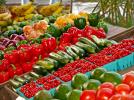Horizon Europe Ambrosia Project: Uniting knowledge, communication, and action for food security in a changing climate
- Type Project
- Status Signed
- Execution 2024 -2027
- Assigned Budget 3.972.738,63 €
- Scope Europeo
- Autonomous community Cataluña; Navarra, Comunidad Foral de
- Main source of financing Horizon Europe 2021-2027
- Project website https://doi.org/10.3030/101181300
Ambrosia aims to transform Europe's approach to food safety in the face of the impacts of climate change. It will enable a holistic, systemic approach to food safety risk assessment throughout the supply chain through the use of digital technologies, including AI.
The EU-funded Ambrosia project, which combines expertise in agri-food modeling and forecasting, climate prediction, and the insights of scientists and experts in predictive food microbiology and risk assessment, will enable modeling of climate change risks and their impact on food security from farm to fork in four major biogeographical regions in Europe. Using a multi-stakeholder approach, Ambrosia will raise awareness, provide strategic advice, and foster the use of the Ambrosia platform for regional and local assessments.
AMBROSIA aims to transform the European approach to food safety in the face of the impacts of climate change. It will enable, for the first time, a holistic and systemic approach to food safety risk assessment across the entire supply chain, taking into account climate change models, through the use of digital technologies, including AI. By connecting the knowledge of agri-food scientists and climate modeling and forecasting experts with experts in predictive food microbiology and risk assessment, AMBROSIA will enable the modeling of climate change risks (individual and cumulative) and their impact on food safety from farm to fork in four major European biogeographic regions (Atlantic, Boreal, Continental, and Mediterranean), as well as the prediction of potential new sources of risk and hazards in the main food groups consumed by EU citizens.
First, the project will develop a tailored, holistic risk assessment methodological framework for studying the impact of climate change on food security. Spatiotemporal climate model projections will be integrated with food security risk models to enable the development of detailed predictive models. A digital platform will then be developed and implemented for integrating climate model projections with food security data to predict and monitor food security risks and hazards arising from climate change events or processes, as well as for communicating mitigation/adaptation measures.
Extensive use will be made of a variety of data sources to enable the full use of AI techniques (deep learning for predictive models) in the field of food safety. The project will focus on Fusarium mycotoxins, a recognized hazard in grains (wheat, oats, barley, corn) and derived products, and enteric pathogens (Salmonella, E. coli) in fresh produce (vegetables and salads). Using a multi-stakeholder approach, AMBROSIA will raise awareness and provide strategic advice on mitigation and adaptation strategies.
- UNIVERSITEIT MAASTRICHT
- BUNDESINSTITUT FUER RISIKOBEWERTUNG
- ELLINIKOS GEORGIKOS ORGANISMOS - DIMITRA
- KONINKLIJKE AHOLD DELHAIZE NV
- E1 DATASCIENCE LTD
- RSK ADAS LIMITED
- ARISTOTELIO PANEPISTIMIO THESSALONIKIS
- INSTITUTO NAVARRO DE TECNOLOGIAS E INFRAESTRUCTURAS AGROALIMENTARIAS SA
- UNIVERSITY OF LEEDS
- SMART AGRO HUB ANONYMI ETAIRIA
- GEOPONIKO PANEPISTIMION ATHINON
- MAAELU TEADMUSKESKUS
- SCIO IKE
- PETERSON PROJECTS BV
- CRANFIELD UNIVERSITY
- Danone Global Research & Innovation Center
- VEEVA SYSTEMS SPAIN S.L.
- STICHTING GREEN SUPPLY CHAIN DIGITAL INNOVATION HUB
- CORDIS project factsheet (pdf)
- UNIVERSITEIT MAASTRICHT website
- BUNDESINSTITUT FUER RISIKOBEWERTUNG website
- RSK ADAS LIMITED website
- Website of ARISTOTHELIUS PANEPISTIMIO THESSALONIKIS
- Website of the Navarre Institute of Agricultural and Food Technologies and Infr…
- University of Leeds website
- GEOPONIKO PANEPISTIMION ATHINON website
- MAAELU TEADMUSKESKUS website
- CRANFIELD UNIVERSITY website
- Danone Global Research & Innovation Center website







